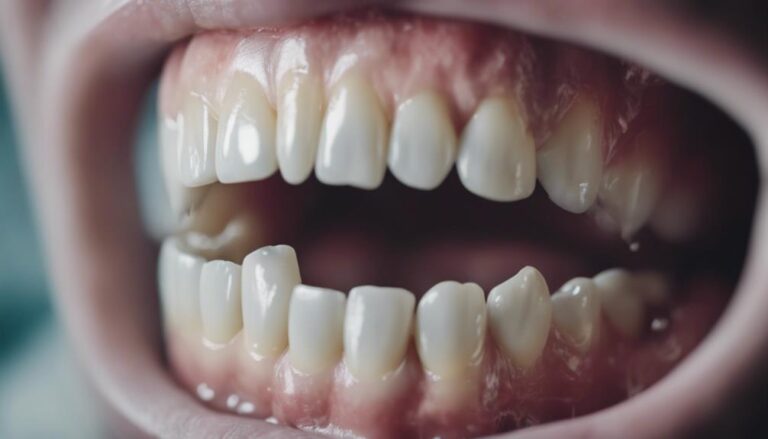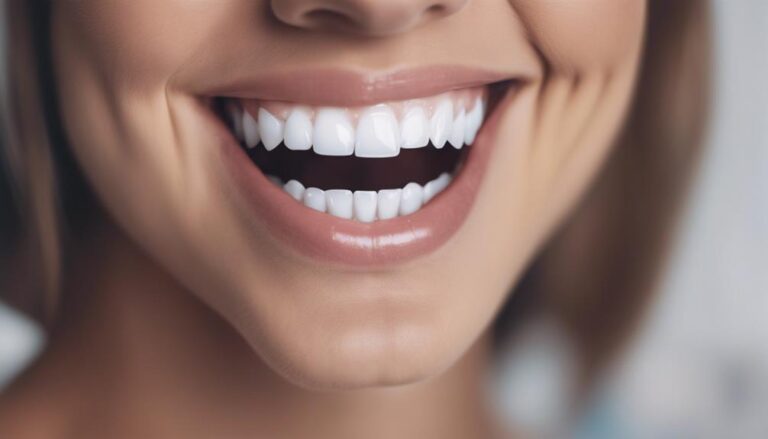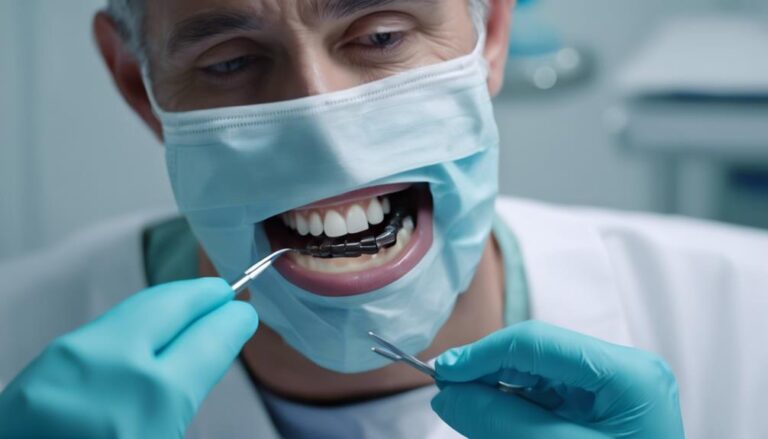Dealing with gum disease and halitosis effectively involves understanding the causes and prioritizing professional dental care. Good oral hygiene, including brushing, flossing, and regular check-ups, plays a key role in prevention. Dental cleanings help detect issues early and maintain oral health. Using a soft-bristled toothbrush at a 45-degree angle with gentle circular motions is essential. Scaling and root planing are effective non-surgical procedures for deep cleaning. Antibacterial mouth rinses and periodontal laser therapy can also be beneficial. Surgical options exist for severe cases. Nutritional considerations and lifestyle changes can further support oral health. Enhance your oral health knowledge by exploring additional strategies.
Key Takeaways
- Maintain proper oral hygiene to prevent gum disease and halitosis.
- Regular dental cleanings for early detection and prevention of oral issues.
- Consider scaling and root planing for deep cleaning and healing.
- Use antibacterial mouth rinses to reduce harmful bacteria.
- Adopt lifestyle changes like balanced nutrition and stress management for improved oral health.
Understanding Gum Disease
Gum disease, also known as periodontal disease, is a common condition that affects the tissues surrounding the teeth. It progresses through various stages, starting with gingivitis, where the gums become inflamed and may bleed easily. If left untreated, it can advance to periodontitis, leading to loss of bone and tissues that support the teeth. Prevention is vital to managing gum disease. Maintaining good oral hygiene practices such as brushing twice a day, flossing daily, and regular dental check-ups can help prevent gum disease from developing or progressing.
Halitosis, or bad breath, is a common symptom of gum disease. Self-care strategies can help manage halitosis. These strategies include proper brushing and flossing techniques to remove food particles and bacteria that can cause bad breath. Additionally, using antimicrobial mouthwashes and staying hydrated can aid in combating halitosis. Seeking professional dental care is important for diagnosing and treating gum disease effectively, especially in its early stages.
Causes of Halitosis
Identifying the root causes of halitosis involves understanding various factors that contribute to bad breath beyond oral hygiene practices. Dietary habits play a significant role in causing bad breath. Foods like garlic and onions contain sulfur compounds that can linger in the mouth and lead to an unpleasant odor. Additionally, a low-carb diet or fasting can also cause bad breath due to the breakdown of fats producing chemicals called ketones.
Chronic conditions can also be underlying causes of halitosis. Conditions such as dry mouth, sinus infections, or gastrointestinal issues can contribute to persistent bad breath. Dry mouth reduces saliva flow, which normally helps cleanse the mouth of food particles and bacteria. Sinus infections can lead to postnasal drip, creating an environment for bacteria to thrive and produce bad breath. Gastrointestinal issues like acid reflux can cause stomach acids to flow back up the esophagus, leading to a foul odor. Understanding these causes is vital in effectively addressing halitosis.
Importance of Oral Hygiene
Maintaining proper oral hygiene is essential for preventing the buildup of bacteria and food particles that can contribute to halitosis. Healthy habits such as brushing your teeth at least twice a day with fluoride toothpaste, flossing daily, and using mouthwash can greatly reduce the risk of developing gum disease and bad breath. By incorporating these preventive measures into your daily routine, you can effectively remove plaque, tartar, and food debris that may lead to oral health issues.
Furthermore, regular dental check-ups are important for detecting any early signs of gum disease or other oral problems. Dentists can provide professional cleanings to remove stubborn plaque and tartar that regular brushing and flossing may miss. They can also offer personalized advice on how to improve your oral hygiene practices at home.
Professional Dental Cleanings
Regular dental cleanings by a professional are an essential part of maintaining excellent oral health and preventing gum disease and bad breath. During these cleanings, the dentist or dental hygienist will thoroughly clean your teeth and gums, removing plaque and tartar buildup that can’t be removed by regular brushing and flossing alone.
Here are three key reasons why professional dental cleanings are vital:
- Early Detection: Regular cleanings allow for the early detection of any potential oral health issues such as gum disease, cavities, or oral cancer. Early detection can lead to more effective treatment and better outcomes.
- Prevention of Gum Recession: Proper cleaning helps prevent gum disease, which is a leading cause of gum recession. Gum recession can lead to tooth sensitivity, aesthetic concerns, and even tooth loss if left untreated.
- Use of Dental Anesthesia: If you have sensitive teeth or gums, your dentist may use dental anesthesia during the cleaning to guarantee your comfort throughout the process. Dental anesthesia numbs the area being treated, making the cleaning a more pleasant experience.
Brushing Techniques
An essential aspect of maintaining excellent oral health is mastering effective brushing techniques. Vital technique is important for removing plaque and preventing gum disease. To achieve this, use a soft-bristled toothbrush at a 45-degree angle to your gums. Employ gentle circular motions, ensuring you cover all tooth surfaces, including the inner, outer, and chewing areas. Avoid aggressive scrubbing, as it can damage the gums and enamel.
Brushing frequency is also key. Dentists recommend brushing at least twice a day, ideally after meals. However, if brushing after every meal isn’t possible, rinsing with water or chewing sugar-free gum can help remove food particles and reduce bacteria levels temporarily.
Flossing Best Practices
Mastering effective flossing techniques is crucial for thorough oral hygiene care and preventing gum disease progression. Proper technique is essential for maximizing the benefits of flossing.
To floss correctly:
- Use Enough Floss: Start with around 18 inches of floss to allow for a fresh section between each tooth.
- Be Gentle but Thorough: Gently slide the floss between your teeth in a zigzag motion, curving around each tooth in a C shape to reach below the gumline.
- Follow a Regular Schedule: Floss at least once a day, preferably before brushing your teeth to remove plaque and food particles effectively.
Flossing helps remove plaque and debris that your toothbrush may miss, reducing the risk of gum disease and preventing bad breath. By incorporating proper technique and maintaining a regular flossing schedule, you can greatly improve your oral health and contribute to fresher breath.
Mouthwash Recommendations
When choosing a mouthwash for excellent oral hygiene, consider its active ingredients and suitability for your specific needs. Look for mouthwashes containing essential oils like tea tree oil, peppermint, or eucalyptus, as these have antibacterial properties that can help combat gum disease and bad breath. Natural remedies such as aloe vera or green tea extract can also be soothing and beneficial for gum health.
If you prefer a more holistic approach, there are DIY alternatives you can explore. Saltwater rinses can help reduce inflammation and promote healing in the gums. Mixing a tablespoon of apple cider vinegar with water can create a mouthwash that helps balance the pH levels in your mouth, preventing bacterial growth.
It’s important to remember that mouthwash should complement your regular oral hygiene routine, not replace it. Always follow the instructions on the bottle, and if you have specific dental concerns, consult with your dentist for personalized recommendations.
Treating Gingivitis Early
Early treatment of gingivitis is essential in preventing the progression to more serious gum disease. When addressing gingivitis at an early stage, implementing preventive measures and early intervention strategies can make a significant difference in halting its advancement.
Here are three key actions to contemplate:
- Effective Oral Hygiene: Brushing at least twice a day and flossing daily are vital in removing plaque buildup that contributes to gingivitis. Using an antimicrobial mouthwash can also aid in reducing bacteria in the mouth.
- Regular Dental Check-ups: Scheduling routine dental visits allows your dentist to detect and address gingivitis early on. Professional cleanings can remove hardened plaque that regular brushing may miss.
- Lifestyle Changes: Adopting a balanced diet, quitting smoking, and managing stress can all positively impact gum health. Maintaining overall health can support your body’s ability to fight off gum disease.
Scaling and Root Planing
Implementing scaling and root planing is a highly effective non-surgical procedure aimed at deep cleaning the teeth and roots to treat gum disease. Gum inflammation can lead to serious issues if left untreated, making prevention vital. During scaling, the dentist removes plaque and tartar from the tooth surface and below the gumline, targeting areas where regular brushing and flossing can’t reach. Root planing involves smoothing out the root surface to remove bacteria and promote healing.
This procedure not only halts the progression of gum disease but also prevents its recurrence. By eliminating bacteria and calculus buildup, scaling and root planing help the gums reattach firmly to the teeth, reducing pocket depths where harmful microbes thrive. As a result, the risk of further inflammation and bone loss decreases significantly.
For individuals with moderate to severe gum disease, scaling and root planing may be an essential step in restoring oral health. Regular follow-up appointments and meticulous oral hygiene practices are paramount to maintain the benefits of this deep cleaning procedure.
Antibacterial Mouth Rinses
Utilizing antibacterial mouth rinses can be an effective adjunct to daily oral hygiene routines in combating gum disease and preventing halitosis.
When selecting an antibacterial mouthwash, consider the following:
- Antibacterial Benefits: These mouth rinses can help reduce the bacteria in your mouth, which is essential in preventing gum disease and bad breath. They target harmful bacteria that may not be adequately removed by brushing and flossing alone.
- Limitations: While antibacterial mouth rinses can be beneficial, they may not address all aspects of gum disease, such as deep pockets or severe infections. It’s important to use them as directed and not solely rely on them for treatment.
- Mouthwash Usage: To maximize the benefits of antibacterial mouth rinses, swish the solution around your mouth for the recommended time. Be sure not to swallow the mouthwash and use it at a different time than when you brush your teeth for best effectiveness.
Periodontal Laser Therapy
Periodontal laser therapy offers a minimally invasive treatment option for addressing gum disease and promoting oral health. With advancements in laser technology, this procedure has become increasingly popular due to its precision and effectiveness. One of the key benefits of laser therapy is its ability to target and remove bacteria from deep within the gum pockets, aiding in gum disease prevention and promoting overall oral health.
Patients undergoing periodontal laser therapy often experience greater comfort during and after the procedure compared to traditional methods. The laser technology used in this treatment minimizes bleeding, swelling, and discomfort, leading to a quicker recovery time. Additionally, the precise nature of the laser allows for targeted treatment, preserving more healthy tissue and promoting better healing outcomes.
Surgical Treatment Options
When considering options for addressing gum disease, surgical treatments provide effective solutions for more advanced cases. Gum surgery options offer precise interventions to combat severe periodontal issues. These procedures are typically performed by periodontists, specialists in gum health.
Here are three common surgical treatment options:
- Gingival Flap Surgery: This technique involves lifting the gums to remove tartar deposits and then securing them back in place. It allows the dentist to access the roots of the teeth for a thorough cleaning and bone reshaping if needed.
- Bone Grafts: In cases where bone loss has occurred due to advanced gum disease, bone grafts can help regenerate the lost bone, providing support for the teeth and preventing further deterioration.
- Pocket Reduction Surgery: This procedure aims to reduce the depth of gum pockets that have formed around the teeth, making it easier to keep them clean and prevent bacteria buildup that leads to gum disease and halitosis.
Nutritional Considerations
Considering the significance of maintaining excellent gum health and addressing halitosis, understanding the role of proper nutrition is essential in supporting overall oral health. A balanced diet rich in vitamins, minerals, and antioxidants can promote gum health and combat bad breath. Additionally, specific dietary supplements and herbal remedies may offer additional benefits. Below is a table outlining some key nutrients and supplements that can aid in gum disease prevention and fresh breath:
| Nutrient/Supplement | Function | Food Sources |
|---|---|---|
| Vitamin C | Supports gum health by aiding in collagen production | Citrus fruits, strawberries, bell peppers |
| Vitamin D | Helps reduce inflammation in the gums | Fatty fish, egg yolks, fortified foods |
| Coenzyme Q10 | Reduces gum inflammation and promotes healing | Organ meats, nuts, seeds |
| Probiotics | Balances oral microbiome and reduces bad breath | Yogurt, kefir, sauerkraut |
| Green Tea | Contains catechins that combat bacteria causing bad breath | Green tea leaves, brewed green tea |
Lifestyle Changes
Wondering how simple lifestyle changes can greatly benefit your gum health and combat halitosis? Making specific modifications to your diet and effectively managing stress levels can play a significant role in improving your overall oral health.
Here are three key lifestyle changes that can help you on your journey to healthier gums and fresher breath:
- Diet Modifications: Incorporating foods rich in vitamins C and D, as well as antioxidants, can bolster your immune system and promote gum health. Additionally, reducing sugary and acidic foods can help prevent plaque buildup and maintain a healthy oral environment.
- Stress Management: High stress levels can weaken your immune system, making you more susceptible to gum disease. Implementing stress-reducing techniques such as meditation, exercise, or mindfulness practices can help lower inflammation in the body and support gum health.
- Healthy Habits: Maintaining good oral hygiene practices like brushing twice a day, flossing regularly, and attending routine dental check-ups are essential components of a healthy lifestyle that can aid in preventing gum disease and halitosis.
Follow-Up Dental Care
To maintain excellent oral health and prevent the recurrence of gum disease and halitosis, consistent follow-up dental care is essential. Post-treatment checkups play an important role in monitoring the progress of the treatment and ensuring that any signs of gum disease or halitosis are promptly addressed. These checkups allow the dentist to assess the effectiveness of the initial treatment, make any necessary adjustments, and provide guidance on preventive measures to avoid future issues.
Long-term maintenance is key to sustaining oral health support. Regular dental visits, typically every six months, are recommended to monitor the condition of your gums and address any emerging concerns promptly. During these visits, your dentist can perform professional cleanings to remove plaque and tartar buildup, reducing the risk of gum disease. Additionally, they can offer personalized advice on proper oral hygiene practices and lifestyle habits to maintain a healthy mouth.
Frequently Asked Questions
Can Stress and Anxiety Contribute to Gum Disease and Halitosis?
Yes, stress and anxiety can contribute to gum disease and halitosis. Stress management plays a vital role in maintaining oral health. It is important to prioritize relaxation techniques alongside thorough oral hygiene practices to prevent these issues.
Are There Natural Remedies That Can Help Treat Gum Disease and Bad Breath?
Herbal remedies like tea tree oil and dietary changes, such as increasing vitamin C intake, can naturally help combat gum disease and bad breath. These methods, when used consistently, can make a noticeable difference.
How Can Hormonal Changes in Women Affect Gum Health and Breath Odor?
Hormonal changes, like those during pregnancy or the menstrual cycle, can lead to gum inflammation and affect breath odor. Understanding how these fluctuations impact oral health is essential for maintaining overall well-being.
Is It Possible to Reverse the Effects of Severe Gum Disease and Halitosis?
Yes, it is possible to reverse the effects of severe gum disease and halitosis. Through a combination of lifestyle changes and professional treatment, substantial improvements can be made. Consistent oral care and regular dental visits are key.
Can Certain Medications Worsen Gum Disease and Cause Persistent Bad Breath?
Certain medications can worsen gum disease and contribute to persistent bad breath. It’s essential to balance medication risks with meticulous oral hygiene practices, mindful diet choices, and cessation of harmful smoking habits to maintain excellent oral health.
Conclusion
Just like a well-tended garden requires daily care and attention to thrive, our oral health also needs consistent maintenance to prevent gum disease and halitosis.
By implementing proper oral hygiene practices, seeking professional dental cleanings, and making necessary lifestyle and nutritional changes, we can guarantee our mouths stay healthy and fresh like a blooming flower garden.
Remember, a healthy smile is a symbol of overall wellness and healthiness.






